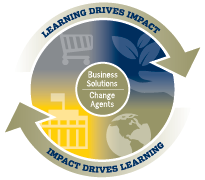Academic Thought - Sustainability Action

The Erb Institute for Global Sustainable Enterprise conducts both scholarly and applied research. Our scholarly work pushes the envelope on sustainability science, while our applied research drives impact here and now through practical hands-on approaches for management. The institute focuses on four priority research areas: Human Development, Global Change, Corporate Governance and Conscious Consumption. Read more about Erb Institute - Business for Sustainability here.
Featuring articles by:
Joe Árvai is the Max McGraw Professor of Sustainable Enterprise, and the Director of the Erb Institute for Global Sustainable Enterprise at the University of Michigan. Joe is an internationally recognized expert in the risk and decisions sciences, with a specific focus on developing and testing decision-aiding tools and approaches that can be used by people to improve decision quality across a wide range of environmental, social, and economic contexts.
Andrew (Andy) Hoffman is the Holcim (US) Professor of Sustainable Enterprise at the University of Michigan. Professor Hoffman's research uses organizational behavior models and theories to understand the cultural and institutional aspects of environmental issues for organizations.
Thomas P. Lyon holds the Dow Chair of Sustainable Science, Technology and Commerce. Professor Lyon uses economic analysis to understand corporate environmental strategy and how it is shaped by emerging government regulations, non-governmental organizations, and consumer demands.

